牛津译林版英语八年级下册Unit 1 Past and Present第3-4课时知识总结(共21张PPT)
文档属性
| 名称 | 牛津译林版英语八年级下册Unit 1 Past and Present第3-4课时知识总结(共21张PPT) |  | |
| 格式 | zip | ||
| 文件大小 | 24.5MB | ||
| 资源类型 | 教案 | ||
| 版本资源 | 牛津译林版 | ||
| 科目 | 英语 | ||
| 更新时间 | 2020-02-05 08:48:58 | ||
图片预览

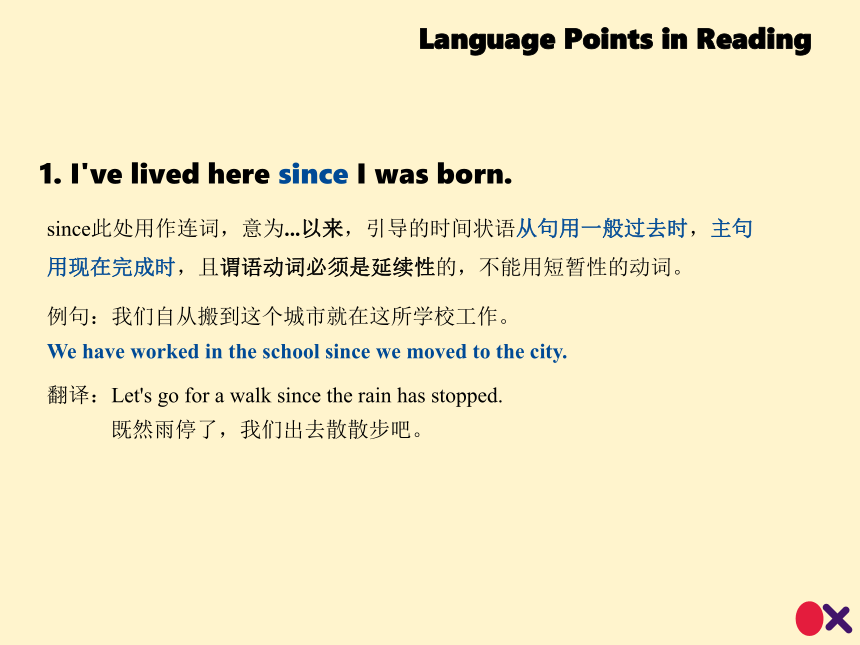
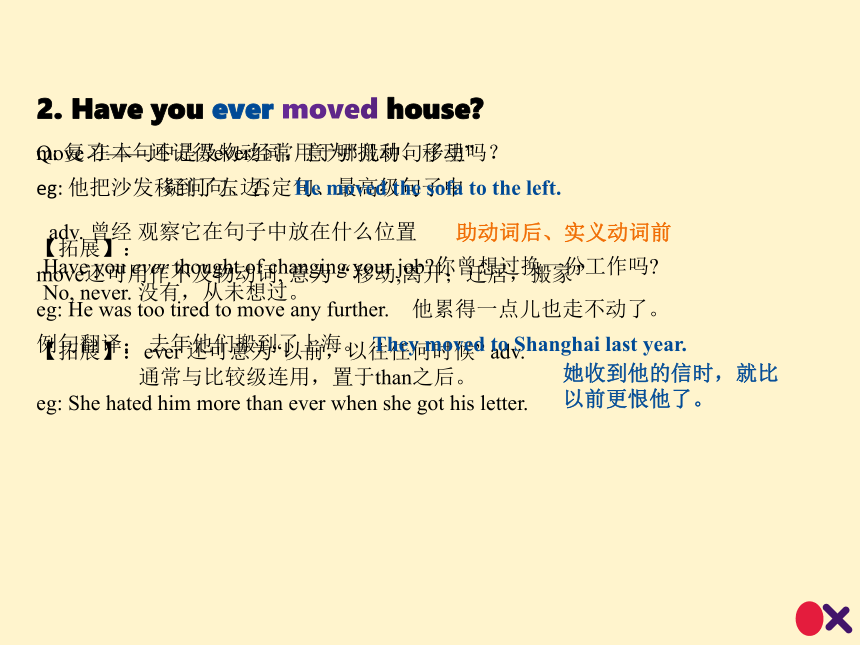
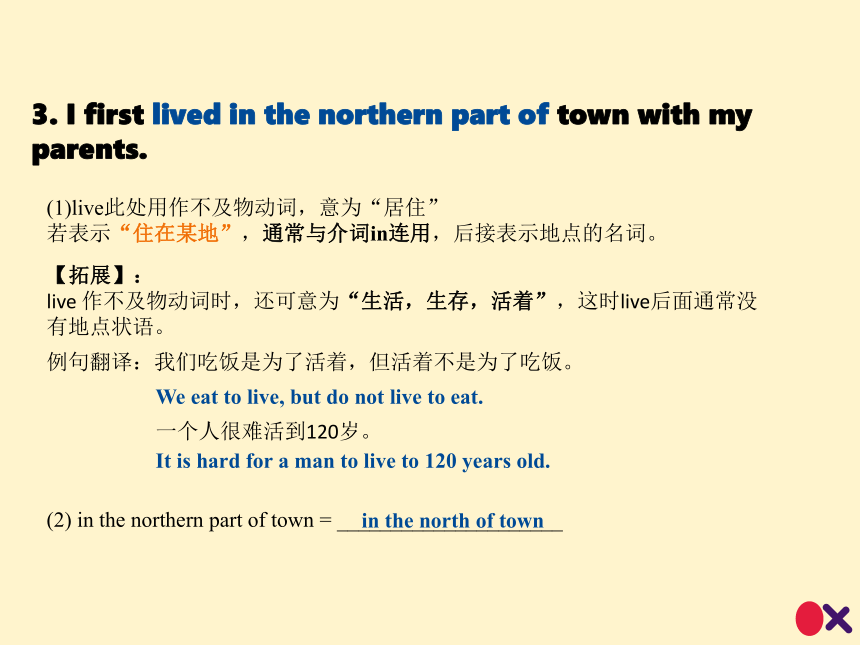
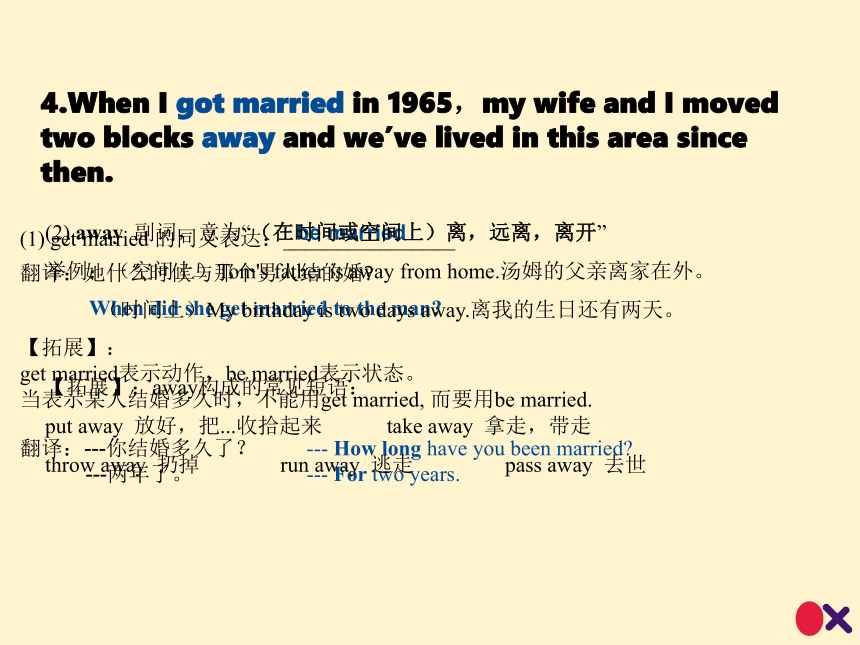
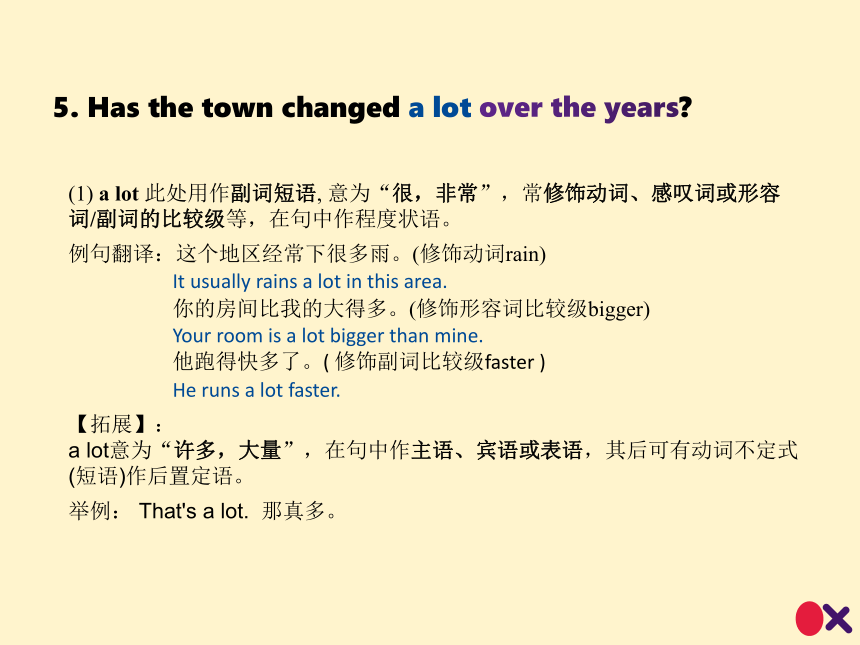
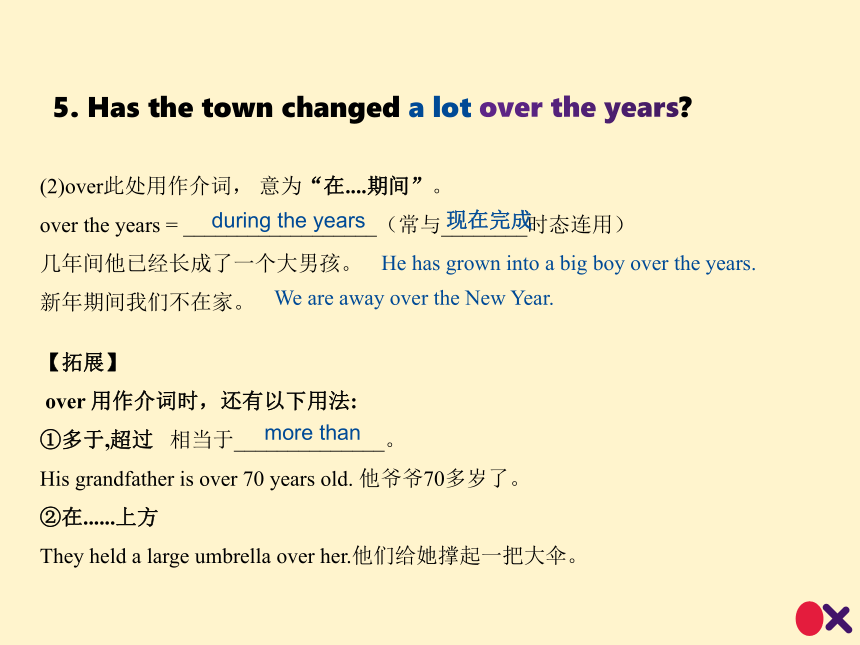
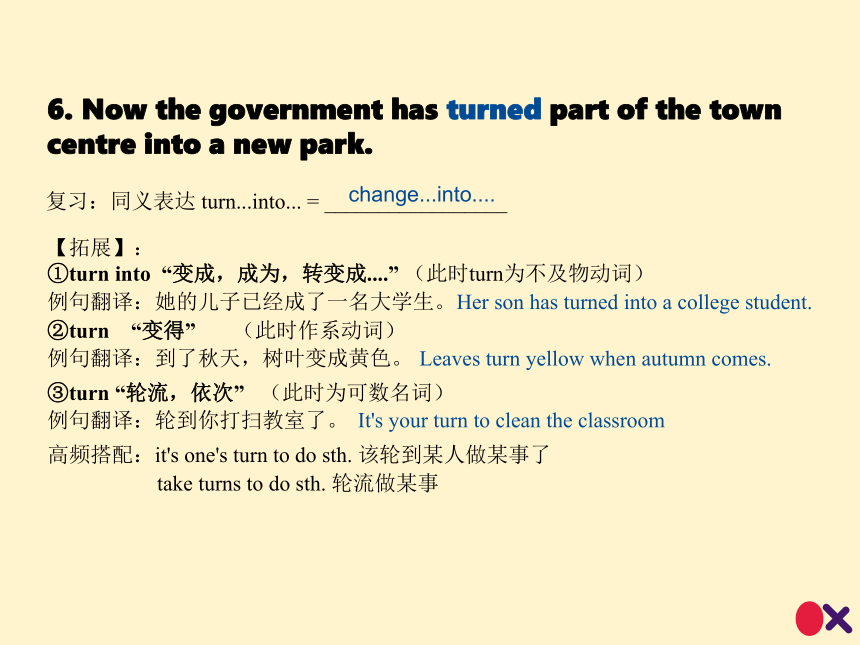
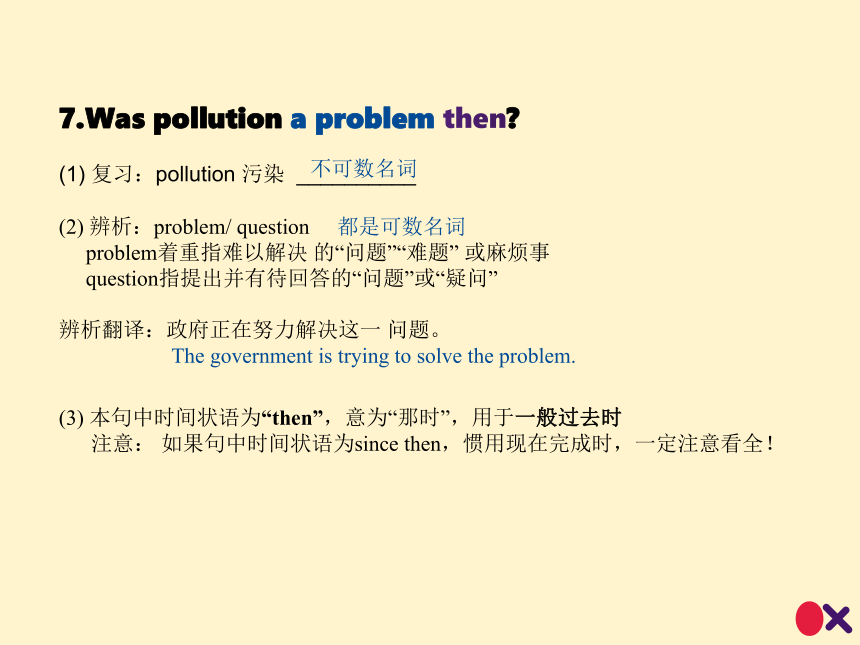
文档简介
(共21张PPT)
XXX同学8BU1
专属一对一英语课
2020/2/4
1. I've lived here since I was born.
since此处用作连词,意为...以来,引导的时间状语从句用一般过去时,主句用现在完成时,且谓语动词必须是延续性的,不能用短暂性的动词。
例句:我们自从搬到这个城市就在这所学校工作。
We have worked in the school since we moved to the city.
翻译:Let's go for a walk since the rain has stopped.
既然雨停了,我们出去散散步吧。
Language Points in Reading
Q: 复习——还记得ever经常用于哪几种句子里吗?
疑问句、否定句、最高级句子中
adv. 曾经 观察它在句子中放在什么位置
Have you ever thought of changing your job?你曾想过换一份工作吗?
No, never. 没有,从未想过。
助动词后、实义动词前
【拓展】:ever 还可意为“以前,以往任何时候” adv.
通常与比较级连用,置于than之后。
eg: She hated him more than ever when she got his letter.
她收到他的信时,就比以前更恨他了。
move 在本句中是及物动词,意为“搬动、移动”
eg: 他把沙发移到了左边。
He moved the sofa to the left.
【拓展】:
move还可用作不及物动词, 意为“移动,离开;迁居,搬家”
eg: He was too tired to move any further.
他累得一点儿也走不动了。
例句翻译: 去年他们搬到了上海。
They moved to Shanghai last year.
3. I first lived in the northern part of town with my parents.
(1)live此处用作不及物动词,意为“居住”
若表示“住在某地”,通常与介词in连用,后接表示地点的名词。
【拓展】:
live 作不及物动词时,还可意为“生活,生存,活着”,这时live后面通常没有地点状语。
例句翻译:我们吃饭是为了活着,但活着不是为了吃饭。
We eat to live, but do not live to eat.
一个人很难活到120岁。
It is hard for a man to live to 120 years old.
(2) in the northern part of town = _____________________
in the north of town
4.When I got married in 1965,my wife and I moved two blocks away and we’ve lived in this area since then.
(1) get married 的同义表达:________________
be married
翻译:她什么时候与那个男人结的婚?
When did she get married to the man?
【拓展】:
get married表示动作,be married表示状态。
当表示某人结婚多久时,不能用get married, 而要用be married.
翻译:---你结婚多久了?
---两年了。
--- How long have you been married?
--- For two years.
(2) away 副词,意为“(在时间或空间上)离,远离,离开”
举例:(空间上)Tom's father is away from home.汤姆的父亲离家在外。
(时间上)My birthday is two days away.离我的生日还有两天。
【拓展】:away构成的常见短语:
put away 放好,把...收拾起来 take away 拿走,带走
throw away 扔掉 run away 逃走 pass away 去世
(1) a lot 此处用作副词短语, 意为“很,非常”,常修饰动词、感叹词或形容词/副词的比较级等,在句中作程度状语。
例句翻译:这个地区经常下很多雨。(修饰动词rain)
It usually rains a lot in this area.
你的房间比我的大得多。(修饰形容词比较级bigger)
Your room is a lot bigger than mine.
他跑得快多了。( 修饰副词比较级faster )
He runs a lot faster.
【拓展】:
a lot意为“许多,大量”,在句中作主语、宾语或表语,其后可有动词不定式(短语)作后置定语。
举例: That's a lot. 那真多。
(2)over此处用作介词, 意为“在....期间”。
over the years = __________________(常与________时态连用)
几年间他已经长成了一个大男孩。
新年期间我们不在家。
We are away over the New Year.
He has grown into a big boy over the years.
during the years
现在完成
【拓展】
over 用作介词时,还有以下用法:
①多于,超过 相当于______________。
His grandfather is over 70 years old. 他爷爷70多岁了。
②在......上方
They held a large umbrella over her.他们给她撑起一把大伞。
more than
6. Now the government has turned part of the town centre into a new park.
复习:同义表达 turn...into... = _________________
change...into....
【拓展】:
①turn into “变成,成为,转变成....” (此时turn为不及物动词)
例句翻译:她的儿子已经成了一名大学生。
Her son has turned into a college student.
②turn “变得” (此时作系动词)
例句翻译:到了秋天,树叶变成黄色。
Leaves turn yellow when autumn comes.
③turn “轮流,依次” (此时为可数名词)
例句翻译:轮到你打扫教室了。
It's your turn to clean the classroom
高频搭配:it's one's turn to do sth. 该轮到某人做某事了
take turns to do sth. 轮流做某事
(1) 复习:pollution 污染 __________
不可数名词
(2) 辨析:problem/ question
problem着重指难以解决 的“问题”“难题” 或麻烦事
question指提出并有待回答的“问题”或“疑问”
辨析翻译:政府正在努力解决这一 问题。
The government is trying to solve the problem.
都是可数名词
(3) 本句中时间状语为“then”,意为“那时”,用于一般过去时
注意: 如果句中时间状语为since then,惯用现在完成时,一定注意看全!
8. They often put the waste into the river.
put的常见高频搭配:
①put on 穿上,戴上,上演(戏剧)
My father put on his coat and left the room.我父亲穿上外套,离开了房间。
They are going to put on a drama.他们要上演一场戏剧。
②put out扑灭
The man put out the fire with a blanket.那个人用毯子把火扑灭了。
③put up举起,搭建
If you have questions in class,you can put up your hand.如果在课堂上有问题,你可以举手
④put in安装
My father once put in a light in my bedroom.我父亲曾在我卧室里安装了一盏灯。
⑤put away收拾好
You had better put your books and pens away after you finish your homework.你做完作业后最好把书和钢笔收起来。
9. Later the government realized the problem and took action to improve the situation.
(1) 复习: realize作“意识到”时的两种用法:
realize sth./ realize+宾语从句
(2) 重要短语:take action to do sth. 采取措施做某事
【拓展】:take常见的搭配
take a look看一看 take notes记笔记 take exercise锻炼
take away拿走 take care保重,当心 take care of 照顾
take down拿下 take out拿出
take off 脱下;(飞机)起飞 take place发生,举行
take part in 参加
(3) improve the situation 改善局面
situation 可数名词,意为“情况,形势”
固定搭配: in a … situation 在…的形势下
例句翻译:他处境困难。
He is in a difficult situation.
这个人在不同情况下会说不同的话。
The man can speak differently in different situations.
10. Now the river is much cleaner.
此处much用来修饰比较级,意为“……得多”
eg. I have much more time than you.我的时间比你的多得多。
【拓展】:其他能修饰形容词或副词比较级的短语
① a little bit意为“一点儿,稍微”
下次你能稍早一点儿来吗?
②even意为“甚至,更”
这次他做得甚至更糟糕。
Can you com a little bit earlier?
This time he did it even worse.
11. It's really nice to have a beautiful modem town.
重点句型:It is+形容词+to do sth. 意为“做某事是....的”
在此句式中it作形式主语,而将真正的主语动词不定式放在后面。
例句翻译:学好一门外语不容易。
It is not easy to learn a foreign language well.
【拓展】:
在“It is+形容词+ to do sth."这句式中,如果要说明动词不定式的动作是谁做的,可在不定式前加一个for/of引起的短语,作不定式的逻辑主语。
其中作表语的形容词是important,necessary, easy,difficult等描述事物特征的形容词时,用for引起的短语;
作表语的形容词是kind,clever, foolish, polite等描述人的性格、品质的形容词时,则用of引起的短语。
It is important ___ you _______ hard.努力学习对你很重要。
It is very kind ___ you _______ me so much money. 你真好,借我这么多钱。
for to study
of to lend
12. Now I feel a bit lonely from time to time.
辨析: a bit / a little
①二者都是表程度的副词短语,修饰形容词、副词原级或比较级时,意义相同,意为“一点儿,有些”。
The pollution here is a bit/little serious.这里的污染有点儿严重。
He walked a bit/little slowly.他走路有点儿慢
②二者都可以作名词短语,充当主语或宾语。
A bit/little is enough for me.我有一点儿就够了。
I know only a bit/little about her.我对她的情况只了解一点儿。
③a little可直接修饰不可数名词, a bit后须加of才可以修饰不可数名词。
here is a little water in the bottle. = _______________________________
There is a bit of water in the bottle.
复习:from time to time = ________ =____________
【拓展】:与time相关的高频短语:
at a time依次 in time及时 on time按时
at any time随时 in no time立刻,马上
all the time 一直 at the same time同时 at times有时
sometimes at times
找出八年级下册课本
Turn to page 8
( )1.- Fred is studying Japanese in an evening school.
- Is that true? He has_______ told me about it.
A. ever B. even C. already D. never
( )2. - Is this the place that you_______? - No. I've never been there before.
A. have visited B. will visit C. are visiting D. visit
( )3. - Hi, I_______ you for a long time!
-I _______ in Beijing. I've just come back.
A. have seen; am B. haven't seen; shall be
C. didn't see; will be D. haven't seen; was
( )4. Have you heard_______ the exam?
A. with B. for C. about D. on
( )5.--Look at these stamps. I_______ them for five years.
-- Wow, they are wonderful.
A. kept B. have kept C. have bought
( )6.I_______you a good weekend.
A. hope B. like C. want D. wish
( )7.I am good at maths, but his English is_______ than mine.
A. much better B. more better
C. very better D. much more better
( )8. The meeting_______ in an hour.
A. took place B. happened C. will happen D. will take place
( )9. - How long have you learned English? -_______ more than 5 years.
A. In B. Since C. Before D. For
A.根据首字母或中文提示写出单词。
1. Go down this street t you reach the traffic lights, then turn left.
2. Most tree leaves ________(变成)yellow and fall down in autumn.
3. Building ________(废料)is the main part of the city rubbish.
4. The man over there is her ________(丈夫).
5. Could I come in for an ________(面试)?
B.用所给单词的适当形式填空。
1. My family ________(move) to Yancheng two years ago.
2. When did your parents get ________ (marry)?
3. ________ your school ________ (change) a lot over the years?
4. In the past, she________ (drink) nothing but coffee.
5. Tom used to_______ (get) up late.
( ) 1. My grandmother lives ________ now but she never feels ________.
A. alone; alone B. lonely; lonely
C. alone; lonely D. lonely; alone
( ) 2. (2010.宿迁)You can’t sneeze and keep your eyes ________at the same time.
A. open B. opens
C. opened D. opening
( ) 3. ---Where do you live?
---I live near the supermarket in the _______ part of the town _______my family.
A. south; with B. southern; with
C. south; near D. southern; near
( ) 4. This coat is ________ tight. I can’t wear it.
A. a bit B. little
C. not a bit D. a bit of
( ) 5. Don’t ________ the window and listen to your teacher carefully in class.
A. look after B. look up
C. look out of D. look down
翻译句子。
1.我和我的弟弟合住一间卧室直到5年前我结婚。
_____________________________________________________________
2.那家鞋厂过去把它的废弃物倒进河里。
_________________________________________________________
3.后来,这个男孩意识到了他的错误,脸变红了。
________________________________________________________
4.看到孩子们如此开心真好。
_________________________________________________________
I shared a bedroom with my brother until 5 years ago, when I got married.
That shoe factory used to dump its waste into the river.
Later, the boy realized his mistake and his face turned red.
It's nice to see that the children are so happy.
作业:
(1) 复习今日课堂笔记
(2) 完成文档作业
XXX同学8BU1
专属一对一英语课
2020/2/4
1. I've lived here since I was born.
since此处用作连词,意为...以来,引导的时间状语从句用一般过去时,主句用现在完成时,且谓语动词必须是延续性的,不能用短暂性的动词。
例句:我们自从搬到这个城市就在这所学校工作。
We have worked in the school since we moved to the city.
翻译:Let's go for a walk since the rain has stopped.
既然雨停了,我们出去散散步吧。
Language Points in Reading
Q: 复习——还记得ever经常用于哪几种句子里吗?
疑问句、否定句、最高级句子中
adv. 曾经 观察它在句子中放在什么位置
Have you ever thought of changing your job?你曾想过换一份工作吗?
No, never. 没有,从未想过。
助动词后、实义动词前
【拓展】:ever 还可意为“以前,以往任何时候” adv.
通常与比较级连用,置于than之后。
eg: She hated him more than ever when she got his letter.
她收到他的信时,就比以前更恨他了。
move 在本句中是及物动词,意为“搬动、移动”
eg: 他把沙发移到了左边。
He moved the sofa to the left.
【拓展】:
move还可用作不及物动词, 意为“移动,离开;迁居,搬家”
eg: He was too tired to move any further.
他累得一点儿也走不动了。
例句翻译: 去年他们搬到了上海。
They moved to Shanghai last year.
3. I first lived in the northern part of town with my parents.
(1)live此处用作不及物动词,意为“居住”
若表示“住在某地”,通常与介词in连用,后接表示地点的名词。
【拓展】:
live 作不及物动词时,还可意为“生活,生存,活着”,这时live后面通常没有地点状语。
例句翻译:我们吃饭是为了活着,但活着不是为了吃饭。
We eat to live, but do not live to eat.
一个人很难活到120岁。
It is hard for a man to live to 120 years old.
(2) in the northern part of town = _____________________
in the north of town
4.When I got married in 1965,my wife and I moved two blocks away and we’ve lived in this area since then.
(1) get married 的同义表达:________________
be married
翻译:她什么时候与那个男人结的婚?
When did she get married to the man?
【拓展】:
get married表示动作,be married表示状态。
当表示某人结婚多久时,不能用get married, 而要用be married.
翻译:---你结婚多久了?
---两年了。
--- How long have you been married?
--- For two years.
(2) away 副词,意为“(在时间或空间上)离,远离,离开”
举例:(空间上)Tom's father is away from home.汤姆的父亲离家在外。
(时间上)My birthday is two days away.离我的生日还有两天。
【拓展】:away构成的常见短语:
put away 放好,把...收拾起来 take away 拿走,带走
throw away 扔掉 run away 逃走 pass away 去世
(1) a lot 此处用作副词短语, 意为“很,非常”,常修饰动词、感叹词或形容词/副词的比较级等,在句中作程度状语。
例句翻译:这个地区经常下很多雨。(修饰动词rain)
It usually rains a lot in this area.
你的房间比我的大得多。(修饰形容词比较级bigger)
Your room is a lot bigger than mine.
他跑得快多了。( 修饰副词比较级faster )
He runs a lot faster.
【拓展】:
a lot意为“许多,大量”,在句中作主语、宾语或表语,其后可有动词不定式(短语)作后置定语。
举例: That's a lot. 那真多。
(2)over此处用作介词, 意为“在....期间”。
over the years = __________________(常与________时态连用)
几年间他已经长成了一个大男孩。
新年期间我们不在家。
We are away over the New Year.
He has grown into a big boy over the years.
during the years
现在完成
【拓展】
over 用作介词时,还有以下用法:
①多于,超过 相当于______________。
His grandfather is over 70 years old. 他爷爷70多岁了。
②在......上方
They held a large umbrella over her.他们给她撑起一把大伞。
more than
6. Now the government has turned part of the town centre into a new park.
复习:同义表达 turn...into... = _________________
change...into....
【拓展】:
①turn into “变成,成为,转变成....” (此时turn为不及物动词)
例句翻译:她的儿子已经成了一名大学生。
Her son has turned into a college student.
②turn “变得” (此时作系动词)
例句翻译:到了秋天,树叶变成黄色。
Leaves turn yellow when autumn comes.
③turn “轮流,依次” (此时为可数名词)
例句翻译:轮到你打扫教室了。
It's your turn to clean the classroom
高频搭配:it's one's turn to do sth. 该轮到某人做某事了
take turns to do sth. 轮流做某事
(1) 复习:pollution 污染 __________
不可数名词
(2) 辨析:problem/ question
problem着重指难以解决 的“问题”“难题” 或麻烦事
question指提出并有待回答的“问题”或“疑问”
辨析翻译:政府正在努力解决这一 问题。
The government is trying to solve the problem.
都是可数名词
(3) 本句中时间状语为“then”,意为“那时”,用于一般过去时
注意: 如果句中时间状语为since then,惯用现在完成时,一定注意看全!
8. They often put the waste into the river.
put的常见高频搭配:
①put on 穿上,戴上,上演(戏剧)
My father put on his coat and left the room.我父亲穿上外套,离开了房间。
They are going to put on a drama.他们要上演一场戏剧。
②put out扑灭
The man put out the fire with a blanket.那个人用毯子把火扑灭了。
③put up举起,搭建
If you have questions in class,you can put up your hand.如果在课堂上有问题,你可以举手
④put in安装
My father once put in a light in my bedroom.我父亲曾在我卧室里安装了一盏灯。
⑤put away收拾好
You had better put your books and pens away after you finish your homework.你做完作业后最好把书和钢笔收起来。
9. Later the government realized the problem and took action to improve the situation.
(1) 复习: realize作“意识到”时的两种用法:
realize sth./ realize+宾语从句
(2) 重要短语:take action to do sth. 采取措施做某事
【拓展】:take常见的搭配
take a look看一看 take notes记笔记 take exercise锻炼
take away拿走 take care保重,当心 take care of 照顾
take down拿下 take out拿出
take off 脱下;(飞机)起飞 take place发生,举行
take part in 参加
(3) improve the situation 改善局面
situation 可数名词,意为“情况,形势”
固定搭配: in a … situation 在…的形势下
例句翻译:他处境困难。
He is in a difficult situation.
这个人在不同情况下会说不同的话。
The man can speak differently in different situations.
10. Now the river is much cleaner.
此处much用来修饰比较级,意为“……得多”
eg. I have much more time than you.我的时间比你的多得多。
【拓展】:其他能修饰形容词或副词比较级的短语
① a little bit意为“一点儿,稍微”
下次你能稍早一点儿来吗?
②even意为“甚至,更”
这次他做得甚至更糟糕。
Can you com a little bit earlier?
This time he did it even worse.
11. It's really nice to have a beautiful modem town.
重点句型:It is+形容词+to do sth. 意为“做某事是....的”
在此句式中it作形式主语,而将真正的主语动词不定式放在后面。
例句翻译:学好一门外语不容易。
It is not easy to learn a foreign language well.
【拓展】:
在“It is+形容词+ to do sth."这句式中,如果要说明动词不定式的动作是谁做的,可在不定式前加一个for/of引起的短语,作不定式的逻辑主语。
其中作表语的形容词是important,necessary, easy,difficult等描述事物特征的形容词时,用for引起的短语;
作表语的形容词是kind,clever, foolish, polite等描述人的性格、品质的形容词时,则用of引起的短语。
It is important ___ you _______ hard.努力学习对你很重要。
It is very kind ___ you _______ me so much money. 你真好,借我这么多钱。
for to study
of to lend
12. Now I feel a bit lonely from time to time.
辨析: a bit / a little
①二者都是表程度的副词短语,修饰形容词、副词原级或比较级时,意义相同,意为“一点儿,有些”。
The pollution here is a bit/little serious.这里的污染有点儿严重。
He walked a bit/little slowly.他走路有点儿慢
②二者都可以作名词短语,充当主语或宾语。
A bit/little is enough for me.我有一点儿就够了。
I know only a bit/little about her.我对她的情况只了解一点儿。
③a little可直接修饰不可数名词, a bit后须加of才可以修饰不可数名词。
here is a little water in the bottle. = _______________________________
There is a bit of water in the bottle.
复习:from time to time = ________ =____________
【拓展】:与time相关的高频短语:
at a time依次 in time及时 on time按时
at any time随时 in no time立刻,马上
all the time 一直 at the same time同时 at times有时
sometimes at times
找出八年级下册课本
Turn to page 8
( )1.- Fred is studying Japanese in an evening school.
- Is that true? He has_______ told me about it.
A. ever B. even C. already D. never
( )2. - Is this the place that you_______? - No. I've never been there before.
A. have visited B. will visit C. are visiting D. visit
( )3. - Hi, I_______ you for a long time!
-I _______ in Beijing. I've just come back.
A. have seen; am B. haven't seen; shall be
C. didn't see; will be D. haven't seen; was
( )4. Have you heard_______ the exam?
A. with B. for C. about D. on
( )5.--Look at these stamps. I_______ them for five years.
-- Wow, they are wonderful.
A. kept B. have kept C. have bought
( )6.I_______you a good weekend.
A. hope B. like C. want D. wish
( )7.I am good at maths, but his English is_______ than mine.
A. much better B. more better
C. very better D. much more better
( )8. The meeting_______ in an hour.
A. took place B. happened C. will happen D. will take place
( )9. - How long have you learned English? -_______ more than 5 years.
A. In B. Since C. Before D. For
A.根据首字母或中文提示写出单词。
1. Go down this street t you reach the traffic lights, then turn left.
2. Most tree leaves ________(变成)yellow and fall down in autumn.
3. Building ________(废料)is the main part of the city rubbish.
4. The man over there is her ________(丈夫).
5. Could I come in for an ________(面试)?
B.用所给单词的适当形式填空。
1. My family ________(move) to Yancheng two years ago.
2. When did your parents get ________ (marry)?
3. ________ your school ________ (change) a lot over the years?
4. In the past, she________ (drink) nothing but coffee.
5. Tom used to_______ (get) up late.
( ) 1. My grandmother lives ________ now but she never feels ________.
A. alone; alone B. lonely; lonely
C. alone; lonely D. lonely; alone
( ) 2. (2010.宿迁)You can’t sneeze and keep your eyes ________at the same time.
A. open B. opens
C. opened D. opening
( ) 3. ---Where do you live?
---I live near the supermarket in the _______ part of the town _______my family.
A. south; with B. southern; with
C. south; near D. southern; near
( ) 4. This coat is ________ tight. I can’t wear it.
A. a bit B. little
C. not a bit D. a bit of
( ) 5. Don’t ________ the window and listen to your teacher carefully in class.
A. look after B. look up
C. look out of D. look down
翻译句子。
1.我和我的弟弟合住一间卧室直到5年前我结婚。
_____________________________________________________________
2.那家鞋厂过去把它的废弃物倒进河里。
_________________________________________________________
3.后来,这个男孩意识到了他的错误,脸变红了。
________________________________________________________
4.看到孩子们如此开心真好。
_________________________________________________________
I shared a bedroom with my brother until 5 years ago, when I got married.
That shoe factory used to dump its waste into the river.
Later, the boy realized his mistake and his face turned red.
It's nice to see that the children are so happy.
作业:
(1) 复习今日课堂笔记
(2) 完成文档作业
